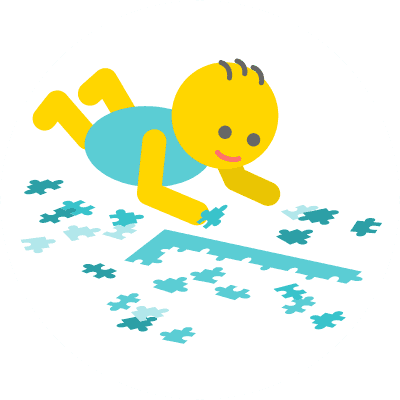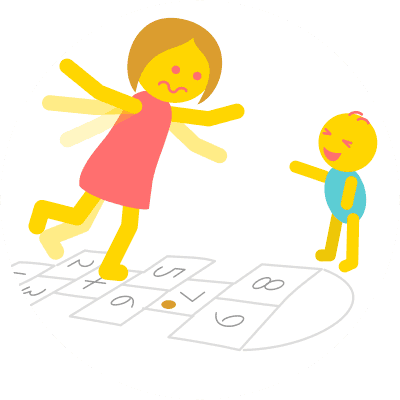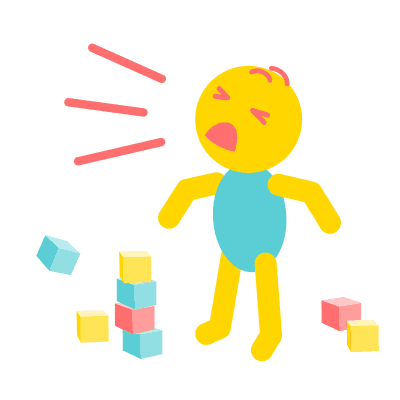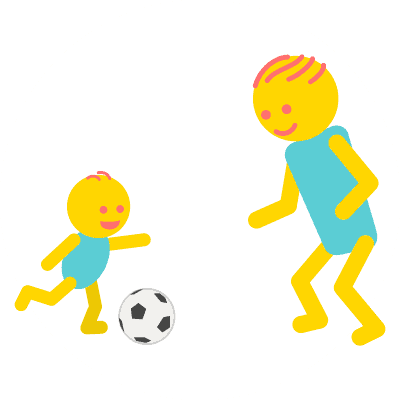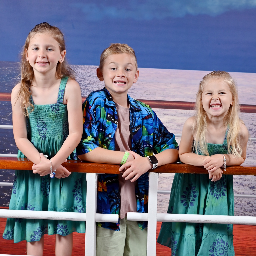Babysitting & Child Psychology (Physical, Cognitive & Social Growth)


Written & Illustrated by
Matthew James Taylor
Kidsit Founder, General Manager

Babysitting Video by
Lydia Kutz
Babysitter, Infant Swimming Resources Instructor

Medically Reviewed by
Gina Maria Jansheski, MD, FAAP
Board-Certified Pediatrician, Medical Reviewer
Key Takeaways
- Understanding Developmental Stages: Familiarize yourself with key psychological theories such as Piaget’s cognitive development stages, Erikson’s psychosocial stages, and Maslow’s hierarchy of needs to better interpret children's behaviors and needs.
- Age-Appropriate Activities: Select activities that align with the child's developmental stage to ensure they are engaging and suitable. For instance, toddlers benefit from sensory play, while school-aged children may enjoy more complex tasks.
- Physical Growth Awareness: Recognize the patterns and milestones in children's physical development, as these can influence their behavior and abilities.
- Cognitive Development Insights: Understand how children's thinking evolves over time, which can help in setting appropriate expectations and providing suitable challenges.
- Social and Emotional Growth: Be aware of the social and emotional milestones children reach, as these affect their interactions and emotional responses.
- Behavioral Guidance: Apply knowledge of child psychology to manage behaviors effectively, using strategies that are developmentally appropriate and supportive.
- Enhancing Communication: Tailor your communication style to the child's developmental level, ensuring clarity and fostering positive interactions.
Babysitting may seem worlds away from the field of psychology. But even a basic understanding of psychology can help you tailor your babysitting strategies to meet the needs of individual children.
How does psychology pertain to babysitting? Two main areas of psychology relate directly to babysitting, child psychology and developmental psychology. Learning a little about each of these can help you get a feel for what age children are developing certain abilities, how to better relate and bond with kids, and how to create opportunities for them that will enrich their development.
In this article, I'll discuss some of the most popular psychological theories that can help to shape how you view a child when you are babysitting. Specifically, I will focus on Piaget's model of cognitive development, Erikson's theory of psycho-social development, and Maslow's hierarchy of needs. By the end, you should have a better understanding of how children develop, both mentally and emotionally, and be able to use that information in practical ways to help the kids you babysit.
Lydia has been working in the childcare industry for 15 years, and owned a childcare agency in Florida, USA for 7 years. In this video she talks about the 6 main child development milestones that babysitters need to be aware of when it comes to child safety.
Playing Amateur Psychologist As A Babysitter
You might be thinking, "I'm not qualified to deal with psychology; I'm just a babysitter!"
Psychology can seem like an intimidating field of study if you've never looked into it before. Like most people, when you think of a psychologist, you probably think of someone like Sigmund Freud who has patients lying on a couch while he listens to their problems and psychoanalyzes them.
But many areas of psychology are a lot more modern and practical than that. In fact, most parenting books are just presenting useful advice for parents and childcare providers, based on the theories of child psychology.
Obviously, you won't be running psychological experiments on the kids you babysit! But there are things you can do to customize your babysitting practices according to their ages and developmental stages. You can provide a better experience for kids when you focus on how their thinking changes as they grow and develop.
Not all babysitters have a psychology degree, but many have other qualifications. Check out my article: Babysitting Qualifications to learn more.
Picking Age-Appropriate Activities
Understanding psychology gives you a better understanding of what types of activities may fit children's needs at certain ages or developmental levels.
You don't want to give a 4-year-old a 2,000 piece lego set because they will quickly become overwhelmed and frustrated. They haven't developed enough cognitive ability to handle a task like that.
On the other hand, you would't want to give a 10-year-old a toy that you play with by putting wooden blocks through a correctly-shaped hole. If they don't think the idea is insulting and beneath them to begin with, they will very quickly get bored with an activity like this! They've advanced beyond the stage of development where such elementary tasks can be even the least bit engaging or serve a purpose.
Then there are some other activities like coloring that most kids of any age seem to enjoy. There are even adult coloring books now! (Here's an excellent one on Amazon)
Psychology can give you a firmer on the needs of children at different ages. Then you can pick an activity for them that brings enjoyment because it stimulates their creativity, and isn't too easy or too challenging.
In fact, the study and understanding of the importance of play is an entire segment of psychology all to itself, and some psychologists devote their entire careers to researching it! (source)
6 Areas That Child Psychology Touches Upon
What kinds of things can child psychology help you to better understand as a babysitter? Quite a bit actually!
1. Physical Growth
You might think that things relating to how the body works are more in the medical realm, but psychology also looks at the speed and pattern of children's growth. Genetic factors and environmental conditions, like disease or poor nutrition, hold particular significance for physical development.
Fun fact: Did you know that children grow from head to toe (cephalocaudal), and from the center of the body outward? (proximodistal) (source)
2. Motor Skills
Psychologists look at changes in how children move as an important signal of development. Newborns start off with mostly reflexive, involuntary movements that gradually develop into more precise, voluntary actions. With the toddling and tumbling of early childhood, kids get a better understanding of how to move their bodies in space as they grow.
3. Cognitive Development
The intellectual and mental abilities that kids achieve over time is also known as cognitive development. It includes things like language, memory, judgement, and problem-solving.
The speed at which kids can think, the amount they can memorize, and the ability to think in abstract ideas all grow steadily with age.
4. Social Development
Early on, babies are quite limited in their emotions and only feel things like happiness, anger, and sadness. As they enter into early childhood, they begin to experience a more complex and varied range of emotions.
As a babysitter, it can be helpful to know that newborns don't seem to experience fear when their parent leaves the room. But around 8 to 12 months of age, it is a normal stage of development for them to become fearful and show signs of separation anxiety when they notice their parent has gone.
5. Gender
Gender is how someone identifies as either male, female, or some other variation. Studies show that kids start to identify themselves as a particular gender as early as 2 years old! (source)
Psychologists are still debating if gender is changeable until late childhood, or if it's something that's established early on.
A good proportion of parents are moving toward raising their children in a more gender-neutral way. This puts more emphasis on letting children decide for themselves instead of pigeon-holing them into specific ways of dressing and playing, or placing limitations on future aspirations based on their genitalia.
Dictating that girls can only play with dolls and boys can only play with toy trucks is now becoming outdated.
Many parents still dress their baby girls in pink and their boys in blue and reinforce traditional gender roles. There isn't necessarily anything wrong with that either, and it comes down to different parenting styles.
As babysitters, we just need to become increasingly aware and sensitive to how gender affects children, and also to respect the wishes of parents.
If you are looking for some gender-specific games to play, see our list of over 200 babysitting activities and filter the results by 'boys' or 'girls' to find exactly what you're looking for.
6. Communication
For kids to master language and the ability to express themselves fully, there are four characteristics of speech they need to grasp.
Phonology relates to the sound of words and letters. As children grow, their accuracy and frequency of producing different sounds should increase.
Lexicon refers to their vocabularly, or the number of words a child knows and can use when they talk.
Morphology relates to the understanding of how words are formed and how they relate to each other.
Pragmatics is the ability to use language to communicate desires or feelings to other people.
Kids start off saying individual, repetitive sounds that form words like "dada." Over time, they add semantics to their speech like, "Where is dad?" Eventually, they learn the syntax of the language (the arrangement of words) and begin to speak in full sentences.
Psychology can help you as a babysitter to understand if a child is ahead or behind the expected level of language development for their age.
Let's Learn Some Psychology Theories
Hopefully, I can cram most of the child-related stuff you would learn in an entire semester of a Psych 101 class into about five minutes of reading for you.
I don't want to bore you with details, so we'll try to keep this as simple and concise as possible.
Piaget's Theory of Cognitive Development
Piaget suggested that children go through four stages as they develop (source).
He believed that children don't just gain more knowledge and information as they get older, but the quality of information they can comprehend actually changes.
Sensorimotor – Birth to 2 years old
At this stage, a child is brand new to the world and trying to figure everything out.
They have some basic reflexes like following interesting objects with their eyes, listening to sounds, sucking objects in their mouth, or grasping an object that comes into contact with their palm (palmar grasp.)
These begin as involuntary reflexes, but are replaced more and more by voluntary actions within the first few months of life.
Infants are mostly concerned with the sensations of their own bodies and figuring out exactly what they are early on. Then later, they begin to shift their focus to how they can interact with the world around them.
Learn more about caring for infants by reading our beginners guide: How to babysit a baby.
Preoperational – 2 to 7 years old
At this stage, kids learn to speak, but they don't yet understand concrete logic and can't manipulate information in their minds. Children also tend to think about things in very black and white terms during this stage, without much room for the grey areas in between.
Kids really like playing and pretending during this period. But they also have a hard time seeing things from the points of view of others. Most of their play and thinking is done symbolically.
Kids in this age group can make use of magical thinking, which is essentially finding a relationship between actions and events, even if a particular outcome doesn't have anything to do with the action (source). For example, a child might develop seemingly random ideas like food only tastes good if they eat it with a blue spoon. Or they might think that squeezing their blanket will keep monsters away at bedtime.
Piaget found that children during this stage lack something called conservation, which is the ability to determine if a certain quantity will remain the same even if it's transferred to another container.
You can take two glasses of water, one tall and one short, that hold exactly the same amount, and pour the water from one to the other. For adults, this demonstrates that the two glasses have the same volume. But for a child in the preoperational stage, they will always say the taller glass is larger, even after watching you show that the amount of liquid is the same.
See our babysitting guides in this range of years:
Concrete operational – 7 to 11 years old
At this stage, kids can begin to use logic appropriately. Their thought processes become more "adult-like" and mature.
Kids at this stage, however, still have trouble thinking in abstract or hypothetical ways. They can only solve problems dealing with concrete objects or events.
Sometimes after the age of 7 years they will begin to understand the concept of conservation discussed above. They can conceptualize that one nickel is worth more than three pennies. But they will struggle to answer a more abstract question like "If A is more than B, and B is more than C, is A more than C?".
Hands-on activities are great and developmentally appropriate for kids that you're babysitting in the concrete operational stage. For example, you could take them on a trip to a petting zoo, or hold a starfish at the aquarium, or even just make objects out of clay or plasticine at home.
See our guide to babysitting preteens for help with this age.
Formal Operational – 12 years old or older
At this stage, kids develop the ability to think in abstract ways. They're able to use deductive reasoning and consider hypothetical "what-if" situations.
Once children reach this stage, they can think about more complex concepts like ethics and morality.
Accommodation and Assimilation
This isn't a stage that kids go through, but a specific observation noted by Piaget that I think is worth mentioning.
When a kid sees something new, they create a new mental schema. A schema is a simplified idea in your head that helps to categorize things.
For example, there's a real bird, and then there's the idea of a bird in your head. It's likely something that has a beak, wings, feathers, and claws.
To put it another way, Polish-American philosopher and scientist, Alfred Korzybski said: "the map is not the territory." Even most adults don't usually stop to realize that there is a distinction between an actual physical bird and the idea of a bird in your mind.
This is a very important concept because the more new experiences that kids are exposed to, the more accurate and expansive set of mental schemata they will create.
Kids start off with only a few categories. So the first time they see a goat or sheep, they might call it a dog. After all, it meets their existing criteria for what a dog is. It's furry, walks on four legs, and is a specific size somewhere between cats and people!
When a child is exposed to a goat for the first time, they get a new mental schema for goat. They might relate it to existing schemas. For example, they may categorize goats in their mind as something that's like a dog, but has a differently shaped head and horns and makes a different noise.
So it's important to expose kids to as many things as possible so they can create an accurate picture of the world in their minds.
Maslow's Hierarchy of Needs
Maslow's hierarchy isn't just something that affects kids. All people fall somewhere within the hierarchy, but I do think it's particularly important for children.
Basically, Maslow's hierarchy is made up of five tiers of things that humans need (source). Usually, they're shown in the shape of a pyramid. Everybody starts at the bottom of the pyramid and must have have their needs met in that category before moving up to the next one.
At the bottom of the pyramid there are the physiological and safety needs. Kids need to feel safe, fed, cared for, and have a home in order for them to thrive. They aren't able to move on to the next stage, where they will worry about belonging and self-esteem, until their basic needs are met.
As a babysitter, you should be aware that it is important to help kids meet their basic needs so they can progress up Maslow's hierarchy to become self-actualized one day, which means "having the desire to become the most that one can be."
Erikson's Stages of Development
Erik Erikson believed that people need to go through eight stages over the course of their life (source).
Each stage has a positive or negative aspect, depending on how a person develops at that age.
For the sake of this article, I'll just talk about the first four relevant stages which cover children from birth to 12 years old.
Trust vs. Mistrust – Birth to 18 months old (Infancy)
If a child is properly cared for during this stage, they'll develop confidence, trust, and optimism.
If they aren't given adequate care, they may become distrustful of the world and feel insecure or worthless.
Autonomy vs. Shame – 18 months to 3 years old (Toddler or Early Childhood)
During this stage, a child learns right from wrong.
This is also the time of the "terrible twos," where kids often become defiant and throw temper tantrums. While it seems like just misbehaving, the stubbornness shown at this age is actually a sign that they're developing autonomy.
Kids need to be given lots of support, praise, and encouragement. Otherwise, they may feel shame and low self-esteem if they aren't able to pick up certain skills right away.
Need some help with a crying child? See our best strategies for How to Calm an Upset Child.
For more advice on dealing with stubborn kids, check out my article: How to Babysit a Difficult Child.
Initiative vs. Guilt – 3 to 5 years old (Preschooler)
At this stage, kids are fascinated by adults in their lives and may start to emulate them during play. A child may play out being a mommy for their doll or pretend to be a doctor.
Kids around this age are trying to figure out what it means to be an adult through experimentation. This helps them develop a sense of initiative and makes them feel secure about making decisions and leading others. Through playing games where they pretend to be people they encounter in life, they explore and begin to understand different roles and the significance of relationships.
If kids are criticized or controlled too much during this stage, they can develop a sense of guilt. Some guilt is necessary, or they will never learn self-control or develop a conscience. But too much guilt can inhibit a child's creativity and make them hesitant to interact with others.
They also tend to get stuck on one very specific question: "Why?" This question helps them analyze the world around them and piece together how everything works.
Industry vs Inferiority – 6 to 12 years old (School Age Child)
Kids in this stage are great at learning and mastering things. It's an excellent time for activities that help them build musical, artistic, and physical skills to enhance their confidence and self-esteem.
Kids who are encouraged to pursue their interests feel industrious (or competent) and get a feeling of confidence from achieving their goals. If they are restricted or not encouraged to do things at this stage, they might feel inferior and start to doubt their abilities and potential.
Of course, just like guilt, some failure is necessary so that kids can develop humility. But it's important to find a healthy balance in order for them to end up with an overall feeling of competence.
Children are also learning to read and write and an ability to do things on their own around this age.
A child's peer group also becomes more significant at this time and this makes a big impact on their self-esteem.
Conclusion
Psychology can give you a lot of insight into children and make you a more effective babysitter.
Regardless of which psychological theories you ascribe to, across the board, it's accepted that kids at different ages have different wants and needs.
By using psychological models to pick babysitting activities that are appropriate for their age and development level, you can keep the kids you're watching engaged and hopefully contribute to their becoming successful adults later in life.
Next:




